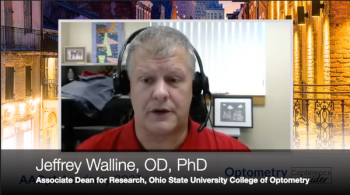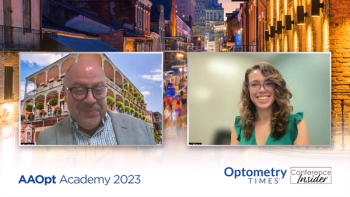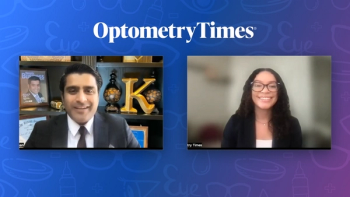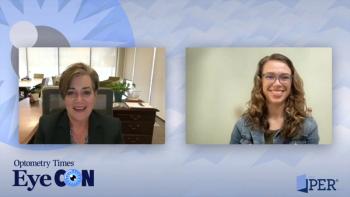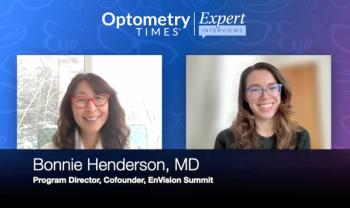
Community care: Connecting mentorship and representation
Jill Saxon, OD, returns to Optometry Times On Air to discuss industry achievements, including the launch of the Women's Leadership Network and the Military Network at Bausch + Lomb.
Audio transcript
Emily Kaiser:
Welcome back to Optometry Times On Air. We are continuing our conversation with Jill Saxon of Bausch + Lomb this week, and we're diving right in. Here we go. Do you find a lot of research opportunities in your current role? And how often are you looking for new innovations?
Jill Saxon, OD:
Absolutely. The beauty of working within industry, particularly at Bausch + Lomb and in the role that I have, is seeing products from conception all the way through execution, as we were just talking about is that research opportunities are consistently provided. It almost feels like it's every day. In fact, I work daily with our medical affairs and our clinical affairs team to identify what are we doing today, and what do we need to plan for the future? And know optometry is involved with that throughout the entire process. So whether we're doing research ourselves, whether we're partnering with other doctors, every single day, in everything that we're doing, we're looking for new innovations. Honestly, not a day goes by that we're not planning for what 1, 2, 5, 10 years from now, we can do as an organization to continue to support optometry and doctors and patients.
Kaiser:
It's always mind-blowing to me how far ahead, you know, science is moving, and it's just really cool to know the new innovation is always on the horizon. Have you noticed a shift in representation in optometry throughout your career? And do you wish that you saw a larger shift?
Saxon:
You know, that's an interesting question. Certainly the answer is yes. Optometry continues to change, and throughout the last 20 years that I've been involved, without question, there's been a shift. And I honestly think that most people, when we talk about shift in optometry, they'll often think of shift from number of providers that might be men to women, or vice versa, or practice owners, or types of practice. But frankly, I have a different perspective on it now with my experience as an optometrist in industry. And I think that the shift that I'm seeing is actually so meaningful to optometry because I see a shift in the number of optometrists that are actually playing key roles within organizations that fall outside of direct patient care, which is what many of us went to school thinking was all we could do.
So now I see folks that may have a degree in optometry that are part of medical affairs, clinical affairs, research, development, marketing, training, even sales, and industry welcomes that today. And they welcome the input of optometrists not just as consultants, which may have been the role that we played before with industry, but rather, today were seen as integral parts of organizations, leadership roles around the country, more than we ever had before.
Kaiser:
Yeah, and that's always really cool, too, because you want the clinicians in the room where it happens, and you know, you want them to be around to make sure that everything's going the way that it needs to be.
Saxon:
100%, and in your mind's eye, right? If we have diversity in thought, and we bring all of those thoughts into the room together, that's where the magic happens, where we can together identify what the needs are today, anticipate the needs from the future, and be able to come together to develop those products and those solutions for patients, and be at the forefront of what innovation is going to become. And every single person in the room here at Bausch + Lomb plays a critical role in that process.
Kaiser:
So can you tell us about a contribution to optometry that has made you proud?
Saxon:
Absolutely. I think in general, optometrists are proud because we can make a contribution to the industry and to our patients every single day.
But as it relates to my role, personally, within industry, there is a particular contribution that I'm extremely proud of, and it was being part of a team that launched Bausch + Lomb Infuse, a silicone hydrogel daily disposable contact lens, that we brought to market during a very interesting time within our nation's history, in 2020.
Frankly, I'm most proud about the launch of the product because of the pathway by which we got there. As a team, we were looking to develop the next contact lens platform; something a little bit different than we had had in the past. And on a personal note, I love to live by the mantra of, "While everybody's doing things a particular way and thinking a certain way--or maybe going right, why can't we look left?" Why can't we do things a little bit differently and challenge ourselves? And that's exactly what we did as an organization developing Infuse.
We were inspired by the opportunity to think a little bit differently and took that inspiration to look beyond just vision, or just comfort, or just the parameters that, as an industry, optometry thought about contact lenses, and went well beyond that. Thinking about the health of the patient, how contact lenses interact with the eye itself, not just as a contact lens on its own. And that's exactly how in medicine, we think about patients--as a whole patient. It's a holistic approach. And it was that process that brought the Bausch + Lomb team together to figure out how we could together develop a product that not only was about thinking differently about a contact lens, but was about challenging ourselves to anticipate what the future of our patients was going to need.
And it stands out personally because of the challenge. Thinking, asking, being curious, understanding the why, thinking bigger--that was what was going through our mind as a team as we developed this product. And in life, it's moments like that, that we find our successes. And looking back, it was because of being able to push ourselves or think differently, challenging the status quo, that we were able to deliver things that we might not have thought we could have delivered or imagined would exist in a way in which it exists today.
And it was that diversity of thought and the coming together of all of these brilliant minds in one space that allowed us to create this lens. And in life, it's no different. If we can challenge ourselves at times where we're looking for things a little bit differently. That's where we find our greatest moments of change. And in medicine for doctors and patients. That's where the magic happens.
Kaiser:
Absolutely. That is certainly an achievement to be proud of. So I also know that mentorship is very important to you. What does it mean to you to be able to mentor other women in an optometry?
Saxon:
So mentorship, I think, is one of the greatest gifts that we can give to each other. And whether it's mentoring young women or young men or those that aren't younger than me, it's a tremendous priority that I've placed on myself because I do believe that if we can leave this world better place than we've come into it, or impact the lives around us in a positive way, then frankly, we've done our job. It's what we need to do as people in this world.
And it's that kind of idea of being able to mentor and shape the lives or be a part of the pathway of the career of those around us that led me to be part of launching the Women's Leadership Network and the Military Network at Bausch + Lomb, bringing people together to help support their growth and development for men and for female professionals. And being part of that support network and that group or that platform by which professionals or [those] aspiring to grow will be given the confidence to put themselves in an environment or put themselves in a challenging environment that will allow them to take those leaps that might have only been something they jumped at in the past.
Kaiser:
That sounds like an unbelievable program. Thank you so much for sharing. And thank you, Jill, for joining us today. It's been an absolutely delightful conversation. It's been lovely to hear about you and your journey. This has been Optometry Times On Air with Jill Saxon, and thank you all for listening.
Newsletter
Want more insights like this? Subscribe to Optometry Times and get clinical pearls and practice tips delivered straight to your inbox.


